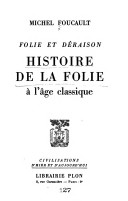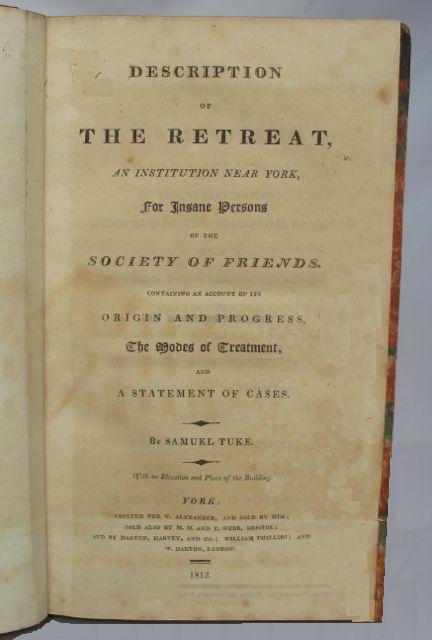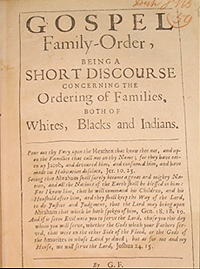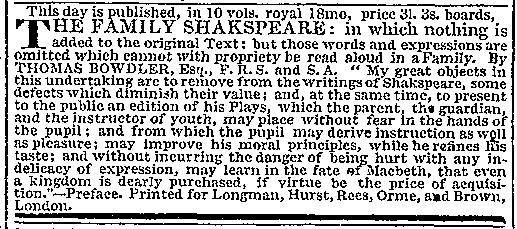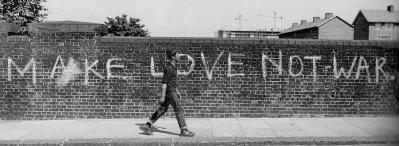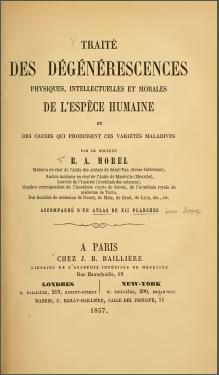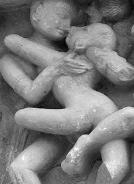|
by Andrew Roberts
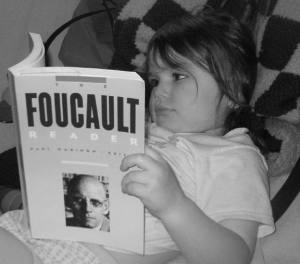
Histories are
bedtime stories - No nightmares please. I like my stories to have a happy
ending, but this one just goes on and on.
|
Different stories
Questioning histories
Do you think about Foucault
as someone who asks questions, or as someone who provides
answers?.
Here, I consider him as asking questions
about the
histories of
(stories about) psychiatry,
criminology and sex.
He tells different stories to question the
first stories without completely replacing them.
|
Foucault appears to recognise some truth in the story of psychiatry and
criminology as movements towards greater
humanity, and in the story that sexual expressions were repressed and then
liberated. But he invites us to consider important questions about how
these stories may distort the truth.
When we have understood the stories he criticises, the questions he asks,
and the new stories he suggests, we cannot rest. Foucault's search for
truth is in the questioning, but the answers lead to more questions.
Foucault says:
"... do you imagine that I would take so much trouble and so
much pleasure in writing ... if I were not preparing ... a labyrinth into
which ... I can move my discourse, opening up underground passages, forcing
it to go far from itself. ..."
Patterns of power and concepts of self
Foucault's work explores patterns of
power within a society, and how power relates
to
the self.
Foucault's approach is usually historical,
attempting to show that
everyday ideas about reality, like
reason and
madness,
punishment, and
sex
change in the course
of history.
History is not simply about the past for Foucault, it
penetrates our everyday lives.
Foucault created new concepts for understanding
many things as
power relations, including not only prisons and the police,
but also the
care of the mentally ill and welfare. When he turned his attention to
explaining power and sex, he challenged the adequacy of the main concepts
of power that we have and suggested others.
Looking back on his work, in a
May 1982 interview, Foucault said that he had been
exploring the
relation between reason, knowledge, truth and power. His
thesis might be
stated as knowledge gives power, although it is not the same
as power.
Born
15.10.1926 in Poitiers
History penetrates Foucault's childhood
"Chancellor Dollfuss was assassinated by the
Nazis in...
1934.

The New York Times 26.7.1934
|
It is something very far from us now. Very few people remember the murder
of Dollfuss. I remember very well that I was very scared by that. I think
it was my first strong fright about death.
I also remember refugees from Spain arriving in Poitiers. I remember
fighting in school with my classmates about the Ethiopian war.
I think that boys and girls of this generation had their childhood formed
by these great historical events. The menace of war was our background, our
framework of existence.
We did not know when I was
ten or eleven years old, whether we would become
German or remain French. We did not know whether we would die or not in the
bombing, and so on."
We could regard Madness and Civilisation as Foucault's contrast and
comparison of the modern 19th century lunatic asylum (beginning with the
Tuke's Retreat) with what had gone before and
Discipline and Punish as Foucault's contrast and
comparison of the modern 19th century prison (beginning with
Bentham's
Panopticon idea) with what had gone before
Foucault on one (reform) version of history
"We know the images. They are familiar in all histories of psychiatry,
where their function is to illustrate that happy age when madness was
finally recognised and treated according to a truth to which we had long
remained blind"
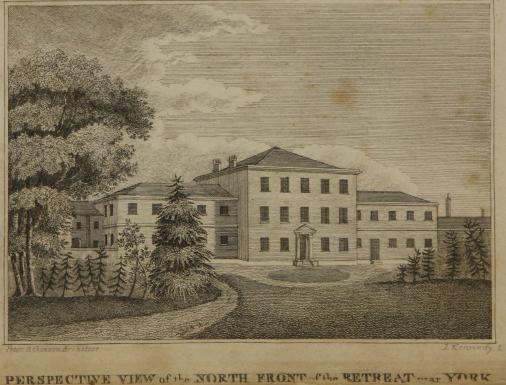
"Thee has had many wonderful children of thy brain dear
William, but this one is surely like to be an idiot"
Esther Tuke to her pig-headed husband who wanted to build
a refuge for lunatic Quakers
Tuke's history of Tuke
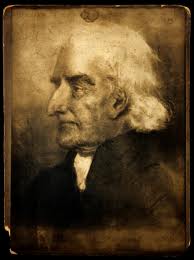
|
The Retreat, near York in England, was first opened in 1796, by
William Tuke and his son, co
founder Henry Tuke. The Tukes were originally tea and coffee merchants, who
were born into and practised
Quaker discipline and principles. As a result
of the death of a former mentally ill friend, who died within the
York
Asylum, they decided to establish a hospital of their own, built
on
humanitarian principles.
Samuel Tuke continued the work of his grandfather,
William, in managing the Retreat.
|
The Description of the Retreat was written in 1813 by Samuel Tuke,
and
focuses on the humanitarian care of the insane within the York Retreat.
The Description of the Retreat outlines a new approach to insanity;
one
which was based on the idea that reason exists within the insane
individual. It is perverted rather than absent.
The Description of the Retreat provided a model (ideal) for asylums
during the period of
therapeutic
optimism

A
Bethlem bleeding cup from the collection of Dennis Leigh
(Leigh, D. 1961, p. 80)
|
The orthodox treatment of insanity in the eighteenth century included using
mechanical restraints to control patients and medical treatments such as
purging and bleeding. The Retreat attempted to replace both mechanical
restraint and medical treatment with what was called moral management.
|
The chapter on
Medical Treatment says that it is to be used a little as
possible in the Retreat. When
it is practised, it must be done with a degree of moderation and carried
out by only the most experienced of superintendents.
"Medicine, as yet, possesses very inadequate means to relieve the most
grievous of human diseases." (Tuke, S. 1813, p.111)"... "But the remedy, in
such cases ought to be applied with great judgement: and its application
should always be witnessed by the master or mistress of the family." (Tuke,
S. 1813, p114).
Later, non-
Quakers applied this idea to large asylums. See, for example,
Harriet Martineau's description
of the Hanwell Lunatic Asylum in June 1834
In the chapter
Moral Management, it is proposed that this is the
best and most appropriate approach to dealing with those of diseased minds.
Moral Management was a system of treating insanity by the institutional
regime of the asylum, rather than by medicines or physical treatments.
"Whatever theory we maintain in regard to the remote causes of insanity, we
must consider moral treatment, or management, of very high importance."...
"Much may be done towards the cure and alleviation of insanity, by
judicious modes of management, and moral treatment." (Tuke, S. 1813, p131-
2).
Tuke argues that if the right type of establishment is created, and with
the correct exercising of moral guidelines then the patient could adopt a
'healthy mind'. Tuke thought that fear and a natural desire for self esteem
were elements which existed within those who were regarded as insane, and
proposed that manipulating these in the desired way could lead the patient
into developing 'self restraint' and 'self control' over their state of
mind.
Moral treatment is not just effective through a specific type of treatment
but also exists within the layout and structure of the Retreat. The Retreat
is designed in a way that allows the mad man to know he is being watched
and that bad behaviour will be recognised. Moral management was not only
embedded within the psychological treatment of the patient but also within
the actual structure of the establishment. Space was an important feature.
The building was purpose built to assist the restoration of the patients to
reason, and not as a place of secure confinement.
The Tukes were one of the first to exercise moral management as the primary
mode of treatment for the insane. They paid little attention to medical
forms of treatment; placing most emphasis on a therapeutic and benevolent
style of treatment.
Foucault's history of Tuke
Asylum as segregation
Foucault says that although "Tuke's gesture... is regarded as an act of
liberation. The truth was quite
different... The Retreat would serve as an instrument of segregation: a
moral and religious segregation which sought to reconstruct around madness
a milieu as much as possible like that of the community of Quakers." He
quotes Samuel Tuke:
"... there has also been particular occasion to observe the great loss,
which individuals of our society have sustained, by being put under the
care of those who are not only strangers to our principles, but by whom
they are frequently mixed with other patients, who may indulge themselves
in ill language, and other exceptionable practices. This often seems to
leave an unprofitable effect upon the patients' minds after they are
restored to the use of their reason, alienating them from those religious
attachments which they had before experienced; and sometimes, even
corrupting them with vicious habits to which they had been strangers."
Fear centred treatment
Foucault quotes Tuke on fear:
"The principle of fear, which is rarely decreased by insanity, is
considered of great importance in the management of the
patients."
This passage continues (not quoted by Foucault):
"But it is not allowed to be excited,
beyond that degree which naturally arises from the necessary regulations of
the family. Neither chains nor corporal punishment are tolerated, on any
pretext, in this establishment".
A further quote on fear, not quoted by Foucault is:
"In an early part of
this chapter, it is stated, that the patients are considered capable of
rational and honourable inducement; and though we allowed fear a
considerable place in the production of that restraint, which the patient
generally exerts on his entrance into the new situation; yet the desire
of esteem is considered, at the Retreat, as operating, in general,
still more powerfully"
The construction of self-restraint
Foucault argues that "at the Retreat the partial suppression of physical
constraint
was part of a system whose essential element was the construction of a
"self-restraint" in which the patient's freedom, engaged by work and the
observation of others, was ceaselessly threatened by the recognition of
guilt. Instead of submitting to a simple negative operation that loosened
bonds and delivered one's deepest nature from madness, it must be
recognised that one was in the grip of a positive operation that confined
madness in a system of rewards and punishments, and included it in the
movement of moral consciousness. A passage from a world of Censure to a
universe of Judgement. But thereby a psychology of madness becomes
possible...
The science of mental disease
The science of mental disease, as it would develop in the asylum, would
always be only of the order of observation and classification. It would not
be a dialogue. It could not be that until psychoanalysis had exorcised this
phenomenon of observation, essential to the nineteenth-century asylum, and
substituted for its silent magic the powers of language.
Is Foucault arguing that asylum psychiatry only observes madness,
whilst psychoanalysis has a dialogue with it? Or that asylum doctors did
not converse with their patients, whereas psychoanalysts do?
No longer repression, but authority
Surveillance and Judgment: already the outline appears of a new personage
who will be essential in the nineteenth century asylum. Tuke himself
suggests this personage, when he tells the story of a maniac subject to
seizures of irrepressible violence. One day while he was walking in the
garden of the asylum with the keeper, this patient suddenly entered a phase
of excitation, moved several steps away, picked up a large stone, and made
the gesture of throwing it at his companion. The keeper stopped, looked the
patient in the eyes; then advanced several steps towards him and
""in a resolute tone of voice ... commanded him to lay down the
stone".
As he approached the patient lowered his hand, then dropped his weapon.
"he then submitted to be quietly led to his apartment"
Something had been born, which was no longer repression, but authority.
1.7.1967 Idiosyncratic structuralist?
In the cartoon, Foucault explains his ideas to three other structuralists.
Levi-Strauss is distracted, Lacan psycho-analyses him and Roland Barthes
looks friendly, but unconvinced.

|
Foucault was a philosopher and historian of systems of
thought. I have seen
him identified with
structuralism or
post-modernism and post-structuralism.
But, reading between the lines, his ideas and concepts suggest
to me that
he would not have enjoyed being labelled, or put into boxes.
To have put
himself into a certain box, in academic terms, would have
meant going
against his own ideas or thoughts. He thought that if you
become wrapped
into a set of 'truths' of a specific knowledge or theory, you
cease to
learn - as you think you know the answers. Then you have
imprisoned
yourself by taking these ideas as true or common knowledge.
I sense if he was to let himself be portrayed under a certain
terminology
he would also then be caught up into a discourse of a certain
set of
language that is unified by common assumptions or beliefs
within an
academic context
(Foucault, M. 1980 Power & Knowledge, Chapter 6).
November 1971: Foucault carries on explaining himself. This time
to
Noam Chomsky

|
""I admit to not being able to define, nor for stronger reasons
to propose, an ideal social model for the functioning of our scientific and
technological society. On the other hand, one of the most urgent tasks,
before everything else, is that we are used to consider, at least in our
European society, that power is in the hands of the government and is
exerted by some particular institutions such as local government, the
police and the army, These institutions transmit the orders, apply them and
punish people who do not obey.
But I think that political power is also exerted by a few other
institutions which seem to have nothing in common with the political power,
which seem to be independent, but which actually are not. We all know that
universities and the whole education system that is supposed to distribute
knowledge, we know that university and the whole educational system
maintain the power of a certain social class and exclude the other social
class from this power. Psychiatry, for instance, is also apparently meant
to improve mankind, and the knowledge of the psychiatrists. Psychiatry is
also a way to implement a political power to a particular social group.
Justice also.
It seems to me that the real political task in a society such as ours is to
criticise the working of institutions, that appear to be both neutral and
independent. To criticise and attack them in such a manner that political
violence that has always exercised itself obscurely through them will be
unmasked, so one can fight against them. If we want right away to define
the profile and the formula of our future society, without criticising all
the forms of political power that are exerted in our society, there is a
risk that they reconstitute themselves, even though such an apparently
noble form as anarchist unionism."
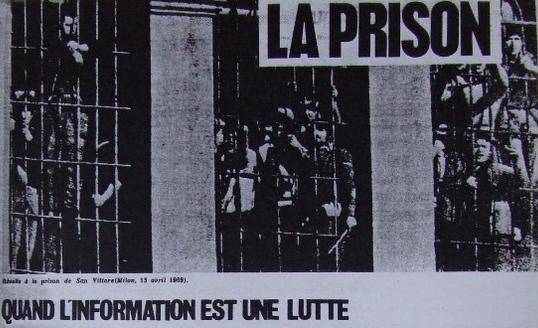
|
Prison: When information is a struggle [political fight]
Michel Foucault was a campaigner against prison secrecy. 8.2.1971
(France)
Manifesto of the Le Groupe d'information sur les prisons signed
by Jean-Marie Domenach, Michel Foucault et Pierre Vidal-Naquet.
Images of knowledge, observation, struggle and power run through the issues
that are discussed below. Le Groupe d'information sur les prisons
was a radical alliance of left wing political activists in local cells who
linked with nearby prisons to secure information about what was happening
inside them. Jean Paul Sartre was one of the people who published the
information in his newspapers. This new technique of political struggle
used information from below. Foucault's book Surveiller et Punir
considers information gathered from above people. It is about information
that can only be seen by people who gather it, not by those it is gathered
about.
|
February 1975 Surveiller et Punir - Observe and punish -
Discipline and punish - Naissance de la prison - Birth of the
prison.
We can consider
Discipline and Punish as Foucault's contrast and
comparison
of the modern 19th century prison (beginning with Bentham's Panopticon
idea) with what had gone before.
PART ONE
TORTURE is about what happened before the 19th century
PARTS TWO, THREE AND FOUR ON
PUNISHMENT - DISCIPLINE - AND PRISON are about
the new system.
|
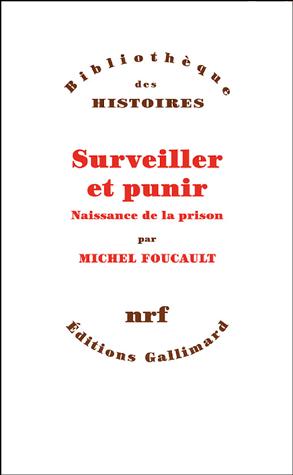
|
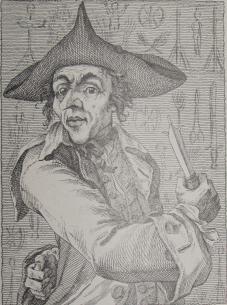
|
5.1.1757 France: Robert-François Damiens, an
unemployed domestic
servant, rushed at King Louise 15th of France, stabbing him with a knife
and inflicting a (not-fatal) wound.
|
Louis 15th of France was five years old when he came to the throne in 1715.
He ruled alone from 1743.
|

|
|
Le supplice [torment - torture] de Damiens le régicide [king-
killer] - illustration from Foucault
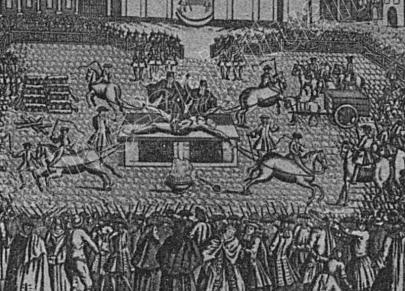
|
Damiens was condemned ( 1.3.1757) as
a regicide (a person who kills a king) and sentenced to be publicly drawn
and quartered, by horses. The execution was carried out on 28.3.1757
|
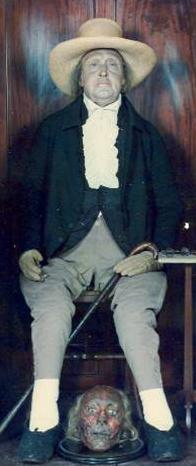
|
Classical (Reform) Criminology
The Italian Cesare
Beccaria and the Englishman
Jeremy Benham are
the two best known people now called
Classical Criminologists. Beccaria thought of prisons as
nasty secret places, but Bentam thought they could be reformed
to become the main means of rational punishment, replacing the barbarities
that Foucault calls
torture.
Beccaria and Bentham were both honoured by the French Revolutionaries who
abolished the
regime of torture (1670) and replaced it with a rational
penal code (1791).
At the end of the eighteenth century,
Jeremy Bentham designed a panopticon, or model instition. He
thought that principles involved i this could
be used to re-design the rest of society.
In the panopticon a supervisor in the centre can see everything that anyone
in the building is doing.
|
1791
The Principle of the Panopticon or Inspection House
by
Jeremy Bentham
Panopticon is derived from Greek, and the best I can do in translating is
all-seeing. It had been used (1768) for a kind of telescope. Bentham used
it in his letters of 1787 (published 1791) for his plan for a circular
institution in which all the inmates cells could be seen from the centre,
where the inmates knew anything they did could be seen, but could not see
if they were being seen. Inspection House (see below) conveys the meaning
in English. The word inspect was translated into French by Foucault as
surveiller, which now means to supervise or have authority over, but comes
from a word (veiller) for staying awake to keep guard whilst others sleep.
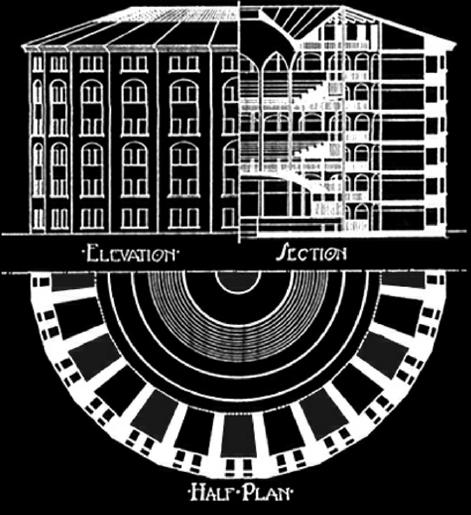
In 1794, Parliament
backed this scheme,
as a prison plan.
The foundations were laid.
But, in January
1803, Bentham was told
the Government could not find the funds
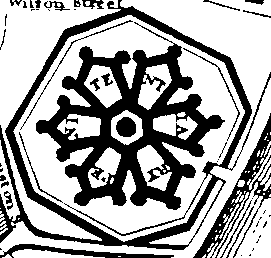
|
Millbank
Penitentiary, opened in 1832, was a modified version
of Bentham's plan which the Government built on the
foundations Bentham laid. It was a distinctive feature on London maps in
the 19th century.
|
Bentham thought that the same plan could be used for schools, orphanages,
workhouses and
many other institutions.
Read Bentham on the Panopticon
Morals reformed - health preserved - industry invigorated instruction
diffused - public burthens lightened - Economy seated, as it were, upon a
rock - the gordian knot of the Poor-Laws are not cut, but untied - all by a
simple idea in Architecture! - Thus much I ventured to say on laying
down the pen - and thus much I should perhaps have said on taking it up, if
at that early period I had seen the whole of the way before me. A new mode
of obtaining power of mind over mind, in a quantity hitherto without
example: and that, to a degree equally without example, secured by whoever
chooses to have it so, against abuse. - Such is the engine: such the work
that may be done with it. How far the expectations thus held out have been
fulfilled, the reader will decide.
Read Foucault on the Panopticon
"Let penalties be regulated and proportional to the offenses,
let the death sentence be passed only on those convicted of murder, and let
tortures that revolt humanity be abolished."
Thus, in 1789, the chancellery summed up the general position of the
petitions addressed to the authorities concerning tortures and executions
Generally speaking, all the authorities exercising individual control
function according to a double mode:
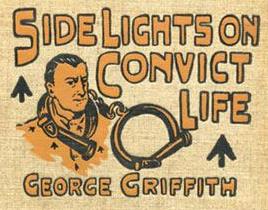
|
binary division and branding (mad/sane; dangerous/harmless;
normal/abnormal)
coercive assignment of differential distribution (who he is; where
he must be; how he is to be characterised; how he is to be recognised; how
a constant surveillance is to be exercised over him in an individual way,
etc.)
|
The constant division between the normal and the abnormal, to which every
individual is subjected, brings us back to our own time... the existence of
a whole set of techniques and institutions for measuring, supervising and
correcting the abnormal brings into play the disciplinary mechanisms...
All the mechanisms of power which, even today, are disposed around the
abnormal individual, to brand him and to alter him, are composed of those
two forms from which they distantly derive.
Bentham's Panopticon is the architectural figure of this composition
Read Louise Warriar and others on
Surveillance
Moderated surveillance is a feature of modern government. Modern because
it relates to the development of the bureaucratic state and industrial (as
distinct from agricultural) economies - Moderated because the camera
watching the streets is limited by laws (unlike the total surveillance
described by George Orwell in Nineteen Eighty Four) - Government by
surveillance because the subject is controlled by the knowledge that the
subject is watched.
Technology makes surveillance possible, but our social theory provides the
framework that makes it meaningful and limits it.
To look at this social theory, we will first analyse the work of Jeremy
Bentham (1748-1832), then look at the analysis of Michel Foucault (1926-
1984), and proceed, in the light of this, to discuss surveillance by closed
circuit television (CCTV) cameras.
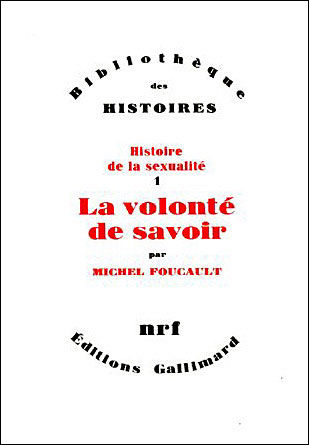
1984 Histoire de la sexualité
volumes 2 and 3.
25.6.1984 Death of Michel Foucault
|
1976 Histoire de la sexualité 1 - La Volonté de
savoir (The History of Sexuality, Volume 1: The will to know).
English
translation 1978
(The History of Sexuality, Volume 1: An Introduction).
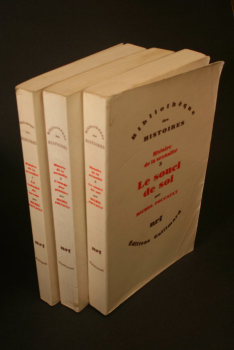
|
Sexual repression and
incomplete liberation - a two-part story
The sexual repression story
Foucault begins:
"For a long time, the story goes, we supported a Victorian regime, and we
continue to be dominated by it even today. Thus the image of the imperial
prude is emblazoned on our restrained, mute, and hypocritical
sexuality".
"At the beginning of the
seventeenth century a certain frankness was still common, it would seem.
Sexual practices had little need of secrecy; words were said without undue
reticence, and things were done without too much concealment"
But twilight soon fell upon this bright day, followed by the monotonous
nights of the Victorian bourgeoisie. Sexuality was carefully confined; it
moved into the home. The conjugal family took custody of it and absorbed it
into the serious function of reproduction. On the subject of sex, silence
became the rule..."
|
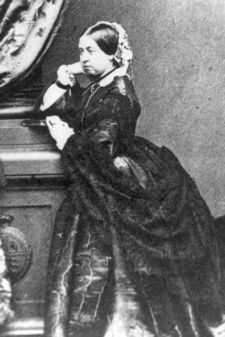 Photograph of
Queen Victoria by John Jabez Edwin Mayall
(1813-1901)
taken on
1.3.1861. If the date is correct, this was taken before the
death of her husband, Albert on 14.12.1861. Mayall
sold thousands of such
images to the public in the 1860s.
Photograph of
Queen Victoria by John Jabez Edwin Mayall
(1813-1901)
taken on
1.3.1861. If the date is correct, this was taken before the
death of her husband, Albert on 14.12.1861. Mayall
sold thousands of such
images to the public in the 1860s.
|
Thomas Bowdler, 11.7.1754 - 24.2.1825
Has given his name to the practice of removing or altering material
considered improper or offensive - Bowdlerisation.
The Times,
10.10.1819 page 4.
As written, Iago in Shakespeare's
Othello (1604) says "I am one,
sir, that comes to tell you your daughter and the Moor are now making the
beast with two backs." [having sex].
Bowdler altered to "I am one, sir, that comes to tell you your daughter and
the Moor are together."
Bowdler says
"I wish it were in my power to say of indecency as I have said
of profaneness, that the examples of it are not very numerous.
Unfortunately the reverse is the case. Those persons whose acquaintance
with Shakspeare depends on theatrical representations, in
which great alterations are made in the plays, can have little idea of the
frequent recurrence in the original text, of expressions, which, however
they might be tolerated in
the sixteenth century, are by no means admissible in the
nineteenth."
Foucault continues:
But have we not liberated ourselves from those two long
centuries in which the history of sexuality must be seen first of all as
the chronicle of an increasing repression? Only to a slight extent, we are
told. Perhaps some progress was made by Freud;...
We are informed that if
repression has indeed been the fundamental link between power, knowledge,
and sexuality since the classical age, it stands to reason that we will not
be able to free ourselves from it except at a considerable cost:...
Hence,
one cannot hope to obtain the desired results simply from a medical
practice, nor from a theoretical discourse, however rigorously pursued.
Thus, one denounces Freud's conformism, the normalizing functions of
psychoanalysis, the obvious timidity underlying Reich's vehemence
Foucault's doubts about the repressive hypothesis
"The doubts I would like to oppose to the repressive hypothesis
are aimed less at showing it to be mistaken than at putting it back within
a general economy of discourses on sex in modern societies since the
seventeenth century.
Why has sexuality been so widely discussed, and what
has been said about it?
What were the effects of power generated by what
was said?
What are the links between these discourses, these effects of
power, and the pleasures that were invested by them?
What knowledge
(savoir) was formed as a result of this linkage?
The object, in short, is
to define the regime of power-knowledge-pleasure that sustains the
discourse on human sexuality in our part of the world.
The central issue,
then (at least in the first instance), is not to determine whether one says
yes or no to sex, whether one formulates prohibitions or permissions,
whether one asserts its importance or denies its effects, or whether one
refines the words one uses to designate it; but to account for the fact
that it is spoken about, to discover who does the speaking, the positions
and viewpoints from which they speak, the institutions which prompt people
to speak about it and which store and distribute the things that are said.
What is at issue, briefly, is the over-all "discursive fact," the way in
which sex is "put into discourse.""
Charles Joseph Jouy (born about 1827) and the construction of
knowledge
Repression is part of the construction of a discourse (field of
knowledge) about sex
Consider the construction of our knowledge or discourse about
paedophilia
|
In the
1867 story of
Charles Joseph Jouy and Sophie Adam
we see how the histories of psychiatry, criminology and sex
inter-twine. We can also see how Foucault is working on the same
labyrinth of ideas
throughout his work.
Foucault's account of Jouy (aged 40), Sophie (a girl) and Sophie's unnamed
friend, is based on an account by two psychiatrists, Henry François
Auguste Bonnet and Jules-Amédée Bulard, published in 1868: a
Medical-legal report on the mental state of Charles-Joseph
Jouy, charged with an
outrage to morals [a sexual crime, rape or indecent
exposure]. Bonnet and Bulard worked at the asylum at
Maréville where Jouy was confined and studied. Their work
was an extension of that of another psychiatrist, previously at the same
asylum,
Benedict Augustin Morel.
Foucault gave two separate versions of this story. The first was in a
1974/1975 lecture, the second in the first volume of his
History of
Sexuality (1976).
I have drawn on both.
|
Charles-Joseph Jouy was about forty years old in 1867. Sophie Adams appears
to have been under eleven years old. Jouy was an illegitimate child whose
mother had died when he was young. Foucault describes him as simple minded
and "more or less the village idiot". He was poorly educated, took whatever
badly paid work he could find, lived a solitary life and tended to get a
bit drunk.
|
One day, Sophie's mother was disturbed by what she found when washing
Sophie's clothes.
On enquiry it emerged that Sophie and a friend had been
masturbating Jouy (in exchange for gifts?) and on the last occasion things
had got out of hand and Sophie had been "almost, partly, or more
or less raped".
|

|
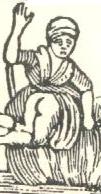
|
Foucault's review of the
evidence suggests that Sophie and her friend had
considered the earlier incidents of masturbating Jouy as an adventure and
had told a villager about them without it being taken as alarming.
The
"almost, partly, or more or less raped" was different, but Sophie did not
tell her mother for fear of being slapped.
Jouy had given the girls money
which they had spent on roasted almonds at the local fair.
|
The picture of
domestic violence is from a woodcut in
"Jack and Jill and Old Dame Gill", a sheet published by J.
Kendrew in York about 1820.
|
French Penal Code of 1810
Attacks upon Morals
330. Whoever shall commit any public outrage against modesty, shall be
punished with an imprisonment of from three months to one year, and a fine
of from 16 to 200 francs.
331. Who shall commit the crime of rape, or shall be guilty of any other
attack upon the modesty, consummated or attempted, with violence, against
an individual of either sex, shall be punished with solitary imprisonment.
332. If the crime has been committed upon the person of an infant, under
the age of fifteen years complete, the criminal shall undergo the penalty
of hard labour for time.
|
A pure object of knowledge
"The thing to note is that they went so far as to measure the
brainpan, study the facial bone structure, and inspect for possible signs
of
degenerescence the anatomy of this personage who up to that
moment had been an integral part of village life; that they made him talk;
that they questioned him concerning his thoughts, inclinations, habits,
sensations, and opinions. And then, acquitting him of any crime, they
decided finally to make him into a pure object of medicine and knowledge -
an object to be shut away till the end of his life in the hospital at
Mareville, but also one to be made known to the world of learning through a
detailed analysis.
Foucault is making the point that, whatever the rights and wrongs of the
incidents that led up to his confinement (*), Charles-Joseph Jouy, village
idiot
aged 40, has now become a lifetime object of science for the new
psychiatry. From the lives of many such as him, a new system of knowledge,
a new way of seeing things, is being created.
Foucault is considering how three types of abnormal (not normal)
individuals were conceptually constructed by science. He calls these the
"monster" - the "little masturbator" and the "individual who cannot be
integrated within the normative system of education". Jouy considered as a
paedophile (a term not then in use) seems to fit each category. By today's
standards, he was a monster:
Joseph (below) is a weaver, aged 55 (about 1857). Morel describes him as
having a deeply corrugated face with a characteristic expression that
denotes ordinary intelligence. He is not someone who drinks excessive
alcohol. He is the father of "cretins" and so Morel
says that we must look in his ancestry and in his features for the
evidence of hereditary transmission. Apparently, his father and
grandfather were semi-cretins, and their [other?] children have
successively died young. Cretinism is associated with goitre - an
enlargement of the thyroid gland.

|
Joseph has only elements of hereditary defect (les éléments
de la continuité de l'espèce). He is a tall, but his
head is disproportionately expanded in its bi-lateral diameter. The
posterior portion is flattened. Cheekbones are salient. His nose is very
enlarged at the base (épaté). His upper lip is an abnormal
height. [I think Morel refers to the area between the nose and the lip. He
says cretins have a similar feature]. His lower jaw is enormous. His
ears are crooked and misshapen. Morel says he has incipient goitre.
|
Solemn discourse "overlays" everyday theatre
Foucault argues that the repression of familiar discussion of sex,
enforcing a polite, sanitised attitude in which children did not "talk
about all these things aloud"
(the sexual repression story), as happened in the period we call
Victorian, was necessary for "institutions of knowledge and power" to
establish the scientific discourse as the overlying one.
At the same time as Jouy was becoming an object of scientific study,
Foucault says:
"One can be fairly certain that during this same period the Lapcourt
schoolmaster was instructing the little villagers to mind their language
and not talk about all these things aloud. But this was undoubtedly one of
the conditions enabling the institutions of knowledge and power to overlay
this everyday bit of theatre with their solemn discourse.
So it was that our society - and it was doubtless the first in history to
take such measures - assembled around these timeless gestures, these barely
furtive pleasures between simple-minded adults and alert children (*), a
whole
machinery for speechifying, analysing, and investigating."
|
Index and contents
Questioning histories
Patterns of power and concepts
of self
Born
History penetrates his
childhood
Madness and Psychiatry
Reform psychiatry -
Tuke
Tuke on Tuke
Foucault on
Tuke
Was he a
structuralist?
Foucault explains
himself
Penology, Criminology and Sociology
Information on prisons
Observe and re-
form
Old fashioned torture
Reform Penology,
Criminology and Sociology - Bentham
Bentham on
Bentham
Foucault on
Bentham
History of sex
Sexual repression
Bowdler
Incomplete
liberation
Foucault's doubts about the repressive hypothesis
Jouy and the construction of
knowledge
Solemn discourse "overlays" everyday theatre
Sex and Sexuality
Short bibliography
|
 Time Line
Time Line
 Social Science Dictionary
Social Science Dictionary
 Durkheim and Weber's contrasting imaginations
Durkheim and Weber's contrasting imaginations
 Andrew Roberts' home page
Andrew Roberts' home page
 Society and Science home page
Society and Science home page
 Chronological Foucault extracts
Chronological Foucault extracts  Other extracts
Other extracts  People and ideas entry
People and ideas entry
 Works
Works  Reviews
Reviews


